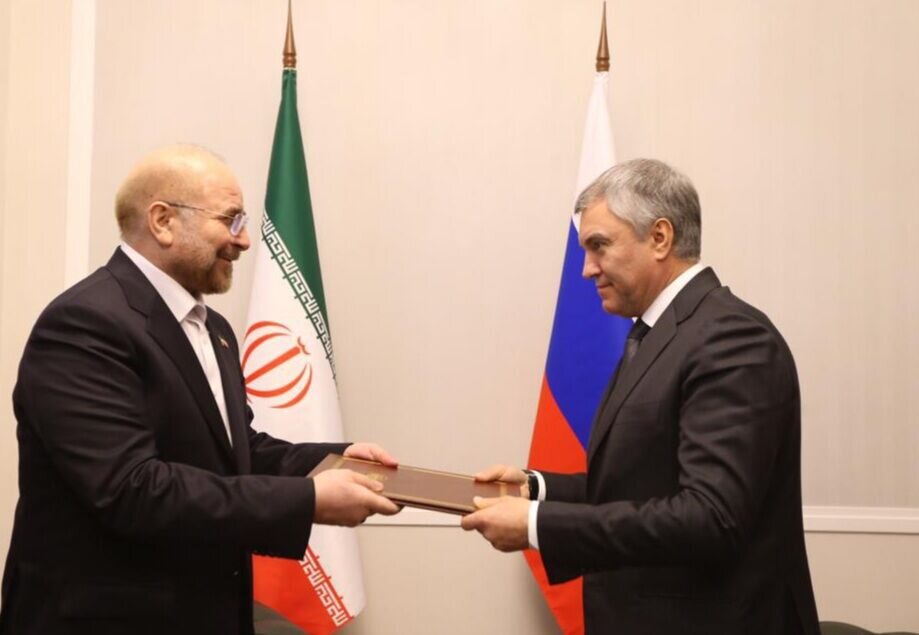Post-American era

TEHRAN – While Western countries portray Iran as being in desperate need to patch up its relations with the United States and Europe, Iran quietly moves to balance its foreign relations by identifying new trends and developments at the international level.
In a bid to keep up with these developments, Speaker of Iran’s Parliament Mohammad Bagher Qalibaf paid an important visit to Russia that could shape Iran’s foreign relations for decades to come.
Last week on Sunday, Ghalibaf left Tehran for Moscow to hold talks with high-ranking Russian officials and deliver an important message from the Leader of the Islamic Revolution Ayatollah Seyed Ali Khamenei to Russian President Vladimir Putin.
The visit was successful, marred only by careless speculations and inaccurate reports on the scheduled meetings of the speaker during his stay in Moscow.
Qalibaf met with his Russian counterpart Vyacheslav Volodin and other officials. Volodin also served as Putin’s special representative in receiving Ayatollah Khamenei’s message.
“My today’s visit to Russia is being done at the invitation of the chairman of the Russian State Duma. The Leader has always underlined our strategic relations with Russia…. One of the outstanding aspects of this visit is that I’m carrying an important message about strategic issues,” Qalibaf told reporters at Tehran’s Mehrabad Airport before leaving for Moscow.
The message’s details are yet to be disclosed. Some Iranian officials suggested that the message was about the current state of play in the region. Hossein Amir-Abdollahian, the special aide to the speaker of the Iranian Parliament on international affairs, noted that the message had something with Iran’s relations with the West after Joe Biden assumed office in the U.S. and the impact of these relations on Tehran’s ties with the emerging powers in the East.
Amir-Abdollahian, who accompanied Qalibaf during his visit to Moscow, said the visit was done in a “sensitive period of time” when new people are moving into the White House.
“The visit… will send a message to the Islamic Republic’s regional allies that Iran will no longer waste time waiting for the game of the White House’s new people or the three European signatories to the JCPOA (France, the UK and Germany),” Amir-Abdollahian said in an article for Khamenei.ir, referring to the 2015 nuclear deal between Iran and major world powers by its acronym.
“Any decision in the White House will not change the Islamic Republic's approach to maintaining, strengthening, developing and consolidating Tehran’s strategic relations with Moscow and Beijing, and the Islamic Republic of Iran's strategic and long-term view of Asia as an important player in the last century,” the special aide continued.
Amir-Abdollahian noted that the White House developments will not affect Iran’s strategic relations and that the Islamic Republic’s regional partners “should know that the White House developments cannot affect our strategic relations.”
He added that Ayatollah Khamenei found it necessary to send a strategic message to Russia in this period.
The message came against a backdrop of renewed efforts to strengthen strategic ties between Iran and Russia on the one hand and with China on the other.
These efforts are being made in midst of a public debate in the West over the U.S.'s possible return to the Iran nuclear deal, officially known as the Joint Comprehensive Plan of Action (JCPOA).
President Joe Biden had vowed to rejoin the JCPOA during his election campaign but he reneged on his promise. Now, the U.S. says it will return to the nuclear deal only after Iran resumes full compliance with the deal.
The Biden administration sought to portray itself as enjoying the luxury of delaying the revival of the JCPOA. But this is not the case. In fact, it is the U.S., not Iran, that desperately needs to revive the deal because Iran is no longer attaching importance to getting the U.S. to rejoin the pact.
Iran is moving to consolidate its relations with emerging powers in the East.
Iran is in the process of negotiating at least two strategic partnership pacts with Russia and China.
The Iran-China partnership deal came under the spotlight in June when the Iranian government approved its draft. China and Iran are in close contact about the 25-year deal.
In addition, Iran is going to upgrade an existing deal with Russia to a strategic level.
Iran is crafting a calibrated strategy to balance its foreign relations with more emphasis on the East. Of course, this does not mean that Iran is going to diminish its ties with the world. Instead, Iran’s efforts to boost ties with the East is another sign that Tehran is drawing on its experience in dealing with the West in the JCPOA over the past few years.
Iran has left the door open for the U.S. and Europe to revive the JCPOA but this time it’s not going to rely on their promises of economic normalization with Tehran.
Amir-Abdollahian even implied that the West has run out of time to win the heart of the Islamic Republic.
“Time for America and Europe is not going to be over, it is over,” the special aide pointed out.
Iran began to sense a new change in the balance of power at the international level and it moved to balance its foreign relations accordingly. This change will make Asia the next power center in a world that America is no longer the dominant power.
“There is no doubt that the 21st century is the century of Asia,” Abdollahian asserted.
Leave a Comment